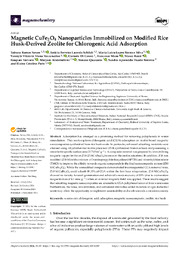Magnetic CuFe2O4 Nanoparticles Immobilized on Modified Rice Husk-Derived Zeolite for Chlorogenic Acid Adsorption.
Magnetic CuFe2O4 Nanoparticles Immobilized on Modified Rice Husk-Derived Zeolite for Chlorogenic Acid Adsorption.
Author(s): NEVES, T. R.; SCHILDT, L. F. L.; SILVA, M. L. L. S. e; VASCONCELOS, V. V. V.; DI CONZO C.; MURA, F.; ROSSI. M.; VARVARO, G.; ABDOLRAHIMI, M.; QUARANTA, S.; FERREIRA, S. A. D.; PARIS, E. C.
Summary: Adsorption has emerged as a promising method for removing polyphenols in water remediation. This work explores chlorogenic acid (CGA) adsorption on zeolite-based magnetic nanocomposites synthesized from rice husk waste. In particular, enhanced adsorbing materials were attained using a hydrothermal zeolite precursor (Z18) synthesized from rice husk and possessing a remarkable specific surface area (217.69 m2 g ?1 ). A composite material was prepared by immobilizing magnetic copper ferrite on Z18 (Z18:CuFe2O4 ) to recover the zeolite adsorbent. In addition, Z18 was modified (Z18 M) with a mixture of 3-minopropyltriethoxysilane (APTES) and trimethylchlorosilane (TMCS) to improve the affinity towards organic compounds in the final nanocomposite system (Z18 M:CuFe2O4 ). While the unmodified composite demonstrated inconsequential CGA removal rates, Z18 M:CuFe2O4 could adsorb 89.35% of CGA within the first hour of operation. Z18 M:CuFe2O4 showed no toxicity for seed germination and achieved a mass recovery of 85% (due to a saturation magnetization of 4.1 emu g?1 ) when an external magnetic field was applied. These results suggest that adsorbing magnetic nanocomposites are amenable to CGA polyphenol removal from wastewater. Furthermore, the reuse, revalorization, and conversion into value-added materials of agro-industrial waste may allow the opportunity to implement sustainability and work towards a circular economy.
Publication year: 2024
Types of publication: Journal article
Unit: Embrapa Instrumentation
Keywords: Magnetic nanocomposite, Rice husk, Zeolite
Observation
Some of Embrapa's publications are published as ePub files. To read them, use or download one of the following free software options to your computer or mobile device. Android: Google Play Books; IOS: iBooks; Windows and Linux: Calibre.
Access other publications
Access the Agricultural Research Database (BDPA) to consult Embrapa's full library collection and records.
Visit Embrapa Bookstore to purchase books and other publications sold by Embrapa.

